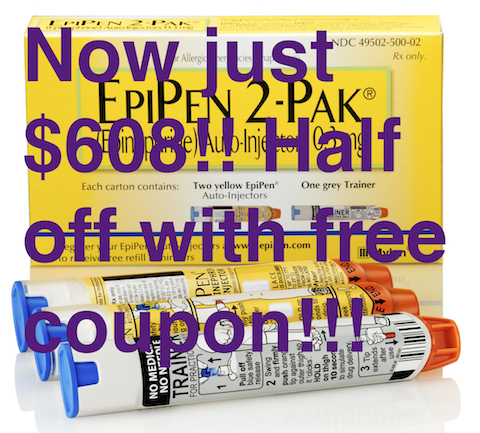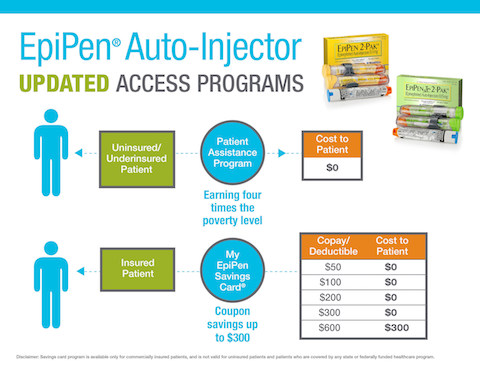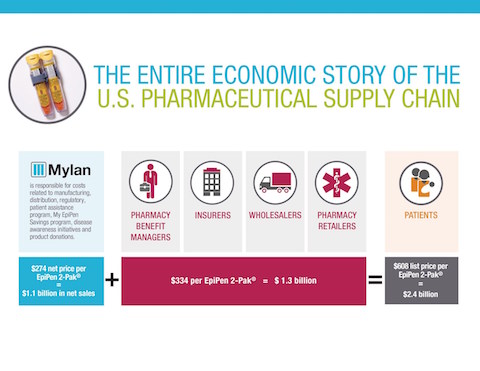At Mylan, Epi-penance is transparent on actions, opaque on reasons

Mylan and its CEO Heather Bresch are under fire. It raised the price of its EpiPen product — an essential protection for people with life threatening allergies — by a factor of five in the last eight years. Mylan’s statement defending itself clarifies what it’s doing — providing rebates — but evades the main issue of why it increased the price in the first place.
Here’s the dialogue between Mylan and the public, in a nutshell:
Public: Why is this thing so hellishly expensive?
Mylan: We’ll help you afford it with coupons and rebates.
Public: Why is this thing so hellishly expensive?
Mylan: We’re on your side. It’s the insurance regulations.
Public: Why is this thing so hellishly expensive???
Mylan: We even give some away to schools!
So Mylan’s position is that it won’t explain the massive price increase on a product where it has a monopoly on a generic medication product that millions of people could die without, a product that’s essentially unchanged from past years.
Like any self-serving release, Mylan’s statement yesterday has a few weasel words. But compared to other releases I’ve analyzed here, it’s actually pretty clear. It just evades the issue people care most about.
Start with the title and subtitle, which tout the discount program (weasel words in bold)
Mylan Taking Immediate Action to Further Enhance Access to EpiPen® (Epinephrine Injection, USP) Auto-Injector
Mylan doubling the eligibility for patient assistance, effectively eliminating out-of-pocket expense for uninsured and under-insured patients
Company to cover up to $300 of out-of-pocket cost at pharmacy; reducing patient cost by 50% off Mylan list price
Mylan also to open pathway to provide EpiPen® Auto-Injector directly to patients
So they’re providing rebates and coupons and, unlike most releases, they cite actual numbers. But those benefits are subject to qualifiers like “effectively” and “up to.” The lede, which explains the details, is wordy but clear (see my translation below):
HERTFORDSHIRE, England and PITTSBURGH, Aug. 25, 2016 /PRNewswire/ — Mylan N.V. (NASDAQ, TASE: MYL) today announced it is taking immediate action to further enhance access to EpiPen®(epinephrine injection, USP) Auto-Injector by expanding already existing programs in recognition of those patients who are facing the burden of higher out-of-pocket costs. The company is reducing the patient cost of EpiPen® Auto-Injector through the use of a savings card which will cover up to $300 for their EpiPen 2-Pak®. For patients who were previously paying the full amount of the company’s list price for EpiPen®, this effectively reduces their out-of-pocket cost exposure by 50%. Mylan also is doubling the eligibility for its patient assistance program, which will eliminate out-of-pocket costs for uninsured and under-insured patients and families as well.
Translation: Don’t worry about the price increase you’re reading about. If you pay full price, we’ll give you $300 back.
CEO Heather Bresch, who’s currently defending the company (but not the price increase) in the media, then adds a warm, fuzzy statement embracing the patients and calling on “all involved” to reform the health care system that enabled her company to jack up the prices on a monopoly drug.
Mylan CEO Heather Bresch said, “We have been a long-term, committed partner to the allergy community and are taking immediate action to help ensure that everyone who needs an EpiPen® Auto-Injector gets one. We recognize the significant burden on patients from continued, rising insurance premiums and being forced increasingly to pay the full list price for medicines at the pharmacy counter. Patients deserve increased price transparency and affordable care, particularly as the system shifts significant costs to them. However, price is only one part of the problem that we are addressing with today’s actions. All involved must also take steps to help meaningfully address the U.S. healthcare crisis, and we are committed to do our part to drive change in collaboration with policymakers, payors, patients and healthcare professionals.”
Translation: We like patients, because they use our drugs. But we’re all part of a corrupt health care system. Somebody ought to fix that.
The next paragraph blames the Affordable Care Act for making people pay more of their health care costs (coincidentally, at the same time Mylan increased its price).
Mylan has worked to help patients with commercial insurance pay as little as $0 for EpiPen® Auto-Injector using the My EpiPen Savings Card®. In 2015, this resulted in nearly 80% of these patients paying nothing out of pocket for their EpiPen® Auto-Injector. However, as the health insurance environment has evolved, driven by the implementation of the Affordable Care Act, patients and families enrolled in high deductible health insurance plans, who are uninsured, or who pay cash at the pharmacy, have faced higher costs for their medicine.
Translation: Everyone involved is increasing prices, including us. As a result, insurance companies aren’t covering as much of those prices. That makes us look bad, but it’s Obamacare’s fault.
Mylan follows this with bullets describing the details of the program, boilerplate about the product and the company, and even sharable graphics. One explains the access program:

And another explains the evil forces that make drugs cost more:

I give credit to Mylan for explaining their position — that they’re helping patients pay and it’s the system’s fault — with tools like a good title, numbers, bullets, and graphics.
But they fail to address the issue of their price increase. Mylan’s pricing has even become a campaign issue for Hillary Clinton. So this response, while clear, is not going to be sufficient.
Bonus: Slime doggy Martin Shkreli comes to Mylan’s defense.
You have severe allergies and need epinephrine? Have your healthcare provider write an Rx for epinephrine and syringes, have the nurse teach you how to use it. It’ll cost you about $10 per dose, so I hear. Tell Mylan to shove their EpiPen up their ass.
This is priceless:
We like patients, because they use our drugs. But we’re all part of a corrupt health care system. Somebody ought to fix that.